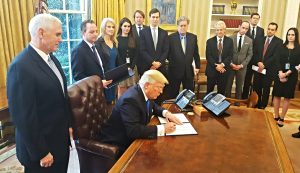On March 14, U.S. Federal Judge Royce Lamberth granted Halliburton’s motion for summary judgment and dismissed Mr. Barko’s claims against Halliburton, filed under the False Claims Act (FCA), which, along the way, resulted in important rulings protecting the attorney client privilege. The case is United States of America ex rel. Harry Barko v. Halliburton Company, et al. As a result of Judge Lamberth’s ruling, this long and protracted litigation may be nearing an end after twelve years and several decision by the federal district court and the U.S. Court of Appeals for the District of Columbia Circuit.
OMB’s Federal Budget Blueprint
Below is a brief summary of the Office of Management and Budget’s recently issued “America First, A budget Blueprint to Make America Great Again.” The Blueprint only provides details on discretionary spending proposals. The full budget, to be released later this spring, will include specific tax proposals and a “full fiscal path.”
POTUS Calls For Plan to Improve the Efficiency, Effectiveness and Accountability of Federal Agencies
Yesterday, the White House published a Presidential Executive Order on a Comprehensive Plan for Reorganizing the Executive Branch directing the Director of the Office of Management and Budget, after a period of review and consultation with the agencies, to propose a plan to streamline the federal government’s executive agencies, both reorganizing governmental functions and eliminating unnecessary agencies. It may take a year to formulate.
CERCLA’s Statute Of Limitations Doesn’t Preempt State Law Claims Based Largely On Negligence, Nuisance And Trespass
On March 9, the U.S. Court of Appeals for the Fourth Circuit issued a ruling affirming the District Court’s rejection of Virginia common law property damage claims based largely on negligence, nuisance, trespass, and argument that the Comprehensive Environmental Response, Compensation, and Liability Act , 42 U.S.C. §§ 9601 et seq. (CERCLA), statute of limitations preempts the application of the Virginia’s five-year statute of limitations. The case is Blankenship v. Consolidation Coal company, et al. Relying on First United Methodist Church of Hyattsville v. U.S. Gypsum Co., the District Court rejected the Blankenships’ argument that Virginia’s statutes of limitations was been preempted by CERCLA, which provides a discovery rule in some circumstances for when state statutes of limitations begin to run and, alternatively, the District Court concluded that, even if CERCLA preempted the Virginia statute, the CERCLA discovery rule would not aid the Blankenships because “they reasonably should have known about their claims more than five years before they filed their actions.”
Cheyenne River Sioux Tribe’s Motion for a Preliminary Injunction Denied
On March 7, the U.S. District Court for the District of Columbia issued a ruling denying a motion for a preliminary  injunction filed by the Cheyenne River Sioux Tribe challenging an easement granted on February 8 by the U.S. Army Corps of Engineers to Dakota Access, LLC, the owners and operators of the Dakota Access Pipeline. It argued that the presence of oil in a pipeline constructed beneath Lake Oahe, a “federally regulated waterway that forms part of the Missouri River and straddles North and South Dakota,” will cause irreparable harm to its members’ religious beliefs in violation of the Religious Freedom Exercise Act (RFRA). According to the District Court, at the start of 2017, the Lake Oahe crossing is the only portion of the pipeline that is not finished. The case is Standing Rock Sioux Tribe and Cheyenne River Sioux Tribe v. U.S. Army Corps of Engineers.
injunction filed by the Cheyenne River Sioux Tribe challenging an easement granted on February 8 by the U.S. Army Corps of Engineers to Dakota Access, LLC, the owners and operators of the Dakota Access Pipeline. It argued that the presence of oil in a pipeline constructed beneath Lake Oahe, a “federally regulated waterway that forms part of the Missouri River and straddles North and South Dakota,” will cause irreparable harm to its members’ religious beliefs in violation of the Religious Freedom Exercise Act (RFRA). According to the District Court, at the start of 2017, the Lake Oahe crossing is the only portion of the pipeline that is not finished. The case is Standing Rock Sioux Tribe and Cheyenne River Sioux Tribe v. U.S. Army Corps of Engineers.
FERC Announces Staff-led Technical Conference
In FERC Enters the Trump Era, The agency announces staff-led Technical Conference as Trump administration expected to name new Commissioners, my colleagues Jeff Merrifield, Sheila McCafferty Harvey, Jeff Delaney and I discuss the Federal Energy Regulatory Commission’s much-anticipated announcement that occurred on March 3 regarding its upcoming staff-led technical conference on wholesale energy and capacity markets.
DOJ’s Great Expectations For Companies’ Compliance Programs
In Great Expectations, DOJ holds anti-corruption compliance programs to a high standard in evaluating their credibility, our colleagues Bill Sullivan, Nancy Fischer and Aaron Hutman discuss the U.S. Department of Justice’s (DOJ) February 8 release of a list of important topics and sample questions that the Criminal Division’s Fraud Section has frequently found relevant in evaluating the adequacy of a corporate compliance program. The new guidance is intended to assist ethics and compliance officers in crafting effective corporate compliance policies and procedures, and signals how DOJ’s new compliance expert, Hui Chen, is expected to assess a company’s compliance program.
Fifth Circuit: Some Degree of Propinquity Is Required To Maintain Claims
In Board of Commissioners of the Southeast Louisiana Flood Protection Authority – East, et al., v. Tennessee Gas Pipeline Company, L.L.C., et al., the U.S. Court of Appeals for the Fifth Circuit issued a unanimous ruling affirming the District Court’s decision to: (a) reject the Board of Commissioners of the Southeast Louisiana Flood Protection Authority–East’s (Board) motion to remand this cost recovery and injunctive action to the state courts of Louisiana; and (b) dismiss the complaint alleging claims against 97 oil and gas companies in connection with their oil and gas operations and activities off the Gulf Coast for any years for failure to state a claim.
A Lesson On The Meaning Of “Harangue” And “Oration”
In U.S. v. Brownstein, the U.S. Court of Appeals for the DC Circuit, reversing the District Court, held that a federal law regulating conduct in the Supreme Court Building, 40 U.S.C. § 6134, which prohibits “harangues and orations” during oral argument, is constitutionally infirm. On April 1, 2015, the defendants interrupted oral argument to announce their displeasure for the Supreme Court’s ruling in the Citizens United v. Federal Election Commission, a political speech case. Noting that the defendants had fair notice of the rules governing conduct in this area, the DC Circuit, citing the movie “My Cousin Vinny,” concluded that a” person of ordinary intelligence could read this law and understand that, as a member of the Supreme Court’s oral argument audience, making disruptive public speeches is clearly proscribed behavior.”
Federal and State Cooperative Efforts Provide Basis For DC Circuit Upholding Delisting of Gray Wolf
In the case of Defenders of Wildlife. et al., v. Zinke., et al., the U.S. Court of Appeals for the DC Circuit reversed the U.S.  District Court for the District of Columbia, and reinstated the U.S. Department of the Interior’s 2012 decision to delist the Wyoming Gray Wolf, which had been listed as an endangered species under the Endangered Species Act (ESA) in 1973. The District Court vacated the rule, holding that the Fish and Wildlife Service’s determination that that the State of Wyoming had put in place adequate regulatory mechanisms in the conservation management plan of the State of Wyoming (Wyoming Management Plan) to protect the wolf was arbitrary.
District Court for the District of Columbia, and reinstated the U.S. Department of the Interior’s 2012 decision to delist the Wyoming Gray Wolf, which had been listed as an endangered species under the Endangered Species Act (ESA) in 1973. The District Court vacated the rule, holding that the Fish and Wildlife Service’s determination that that the State of Wyoming had put in place adequate regulatory mechanisms in the conservation management plan of the State of Wyoming (Wyoming Management Plan) to protect the wolf was arbitrary.




